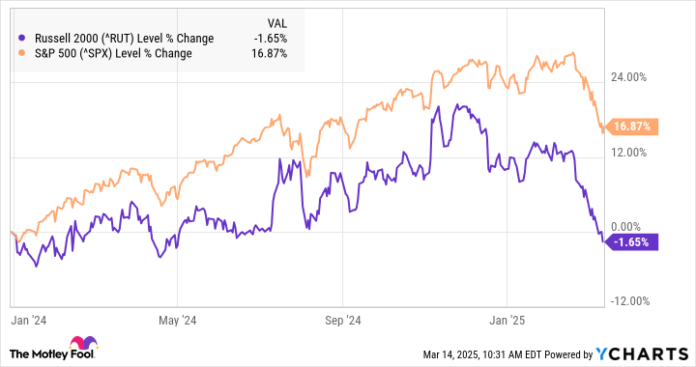The benchmark S&P 500 index lately reached correction territory, indicated by a ten% drop from its highs. However sure different components of the inventory market have been hit even more durable.
One massive space of underperformance within the current market sell-off is small-cap shares. The Russell 2000 small-cap index is down by greater than 18% from its late-2024 peak, and to be truthful, there are some good causes. For instance, there are rising fears of a recession, and this usually impacts smaller corporations to a better extent.
Nevertheless, small-cap shares seemed like a superb alternative for long-term buyers initially of the 12 months, they usually look much more engaging proper now. That is why the Vanguard Russell 2000 ETF (VTWO 2.44%) is on the high of my purchase listing proper now.
What’s the Vanguard Russell 2000 ETF?
Because the title suggests, the Vanguard Russell 2000 ETF is an index fund that tracks the Russell 2000, which is broadly thought of to be the perfect indicator of how small-cap shares are doing.
The median market cap of a Russell 2000 firm is $3.3 billion, and though this can be a weighted index, no inventory makes up greater than 0.6% of the fund, a pointy distinction to the mega-cap-heavy S&P 500. The fund’s high holdings are Sprouts Farmers Market, Insmed, and Vaxcyte. For those who aren’t too conversant in any of these, that is form of the purpose — a broad small-cap ETF like this lets you get publicity to a variety of smaller corporations with out the necessity to analysis investments.
Like different Vanguard index funds, this can be a very low-cost ETF, with a 0.07% expense ratio. Which means for each $10,000 you make investments, your annual funding prices are simply $7. (This is not a charge it’s important to pay — it would merely be mirrored within the fund’s efficiency over time.)
A large valuation hole
The Vanguard Russell 2000 ETF was low cost a 12 months in the past and has solely turn out to be even cheaper. At first of 2024, small caps had been buying and selling for his or her lowest price-to-book valuation relative to their large-cap counterparts for the reason that late Nineties. Nevertheless, due to the factitious intelligence (AI)-fueled surge in mega-cap tech shares final 12 months, the hole solely bought wider. Even this 12 months, with the S&P 500 in correction territory, the Russell 2000 has carried out even worse.
This has resulted in a large valuation hole between small-cap and large-cap shares. Simply check out among the key metrics:
|
Metric |
S&P 500 Median |
Russell 2000 Median |
|---|---|---|
|
P/E ratio |
27.5 |
17.8 |
|
P/B ratio |
5.0 |
2.0 |
|
Earnings progress price |
18.9% |
14.3% |
Information supply: Vanguard. As of 1/31/2025.
That is as of Vanguard’s newest information on the finish of January. The gaps have widened even additional since then within the current correction. Additionally discover that whereas the standard S&P 500 inventory is rising earnings sooner, it is not a sufficiently big distinction to justify such a large valuation hole.
To be truthful, I do not suppose the hole will utterly shut. The S&P 500 has a disproportionate quantity of high-growth (learn: high-valuation) tech shares and deserves considerably of a premium. However that is the widest hole between the 2 indexes in a very long time, and as I am going to talk about within the subsequent part, small caps may catch up.
Small-cap shares may very well be massive winners in a rebound
For one factor, whereas small-cap shares have been disproportionately hit by recession fears, tariff uncertainty, and disappointing financial information, the precise reverse may very well be the case as soon as these items flip round.
It is also price noting that expectations for Federal Reserve rate of interest cuts for this 12 months have elevated considerably over the previous few weeks, with the median expectation now calling for 3 or 4 quarter-point price cuts, up from an expectation of only one at the beginning of the 12 months.
Small caps may very well be a giant winner as charges fall. As a bunch, small caps are extra reliant on borrowed cash, and decrease rates of interest may definitely assist. Plus, as charges fall, cash ought to begin popping out of issues like Treasury securities and CDs and flowing into the market, which may very well be a giant assist for “riskier” shares like small caps.
Lastly, there’s additionally the prospect of issues like tax cuts and regulatory reform which are a part of the Trump administration’s plans. As soon as the mud settles on the tariff uncertainty, these may very well be a giant enhance for smaller corporations.
To be completely clear, I don’t know if the market turbulence and correction are near an finish. If the financial information will get worse or the tariff uncertainty intensifies, simply to call a number of examples, issues may worsen earlier than they get higher. However from a long-term perspective, the Russell 2000 ETF seems to be like an awesome alternative proper now, and I am assured long-term buyers who take benefit now might be glad they did.


